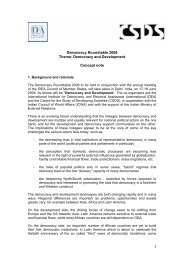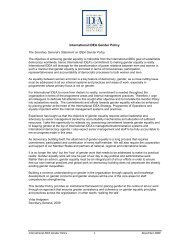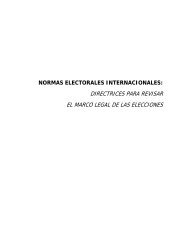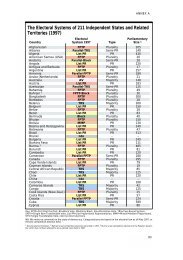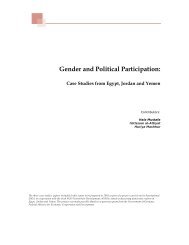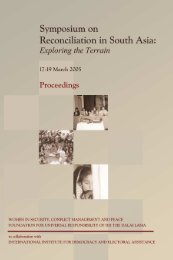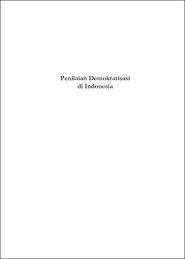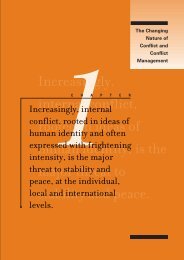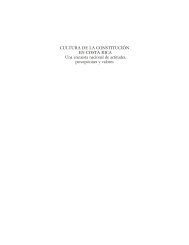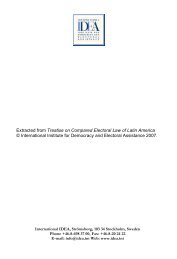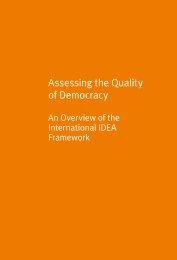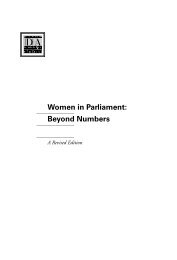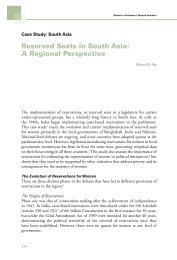The Role of State Constitutions in Protecting ... - International IDEA
The Role of State Constitutions in Protecting ... - International IDEA
The Role of State Constitutions in Protecting ... - International IDEA
Create successful ePaper yourself
Turn your PDF publications into a flip-book with our unique Google optimized e-Paper software.
Yoruba k<strong>in</strong>gdom, the Ben<strong>in</strong> k<strong>in</strong>gdom, the Fulani emirate, the Igbo traditional<br />
system, the Urhobo gerontocratic system etc. All these changed with the conquest<br />
<strong>of</strong> Lagos <strong>in</strong> 1861 by the British and the subsequent amalgamation <strong>of</strong> Southern<br />
and Northern Nigeria <strong>in</strong> 1914. As a result <strong>of</strong> <strong>in</strong>tense struggle, Nigeria ga<strong>in</strong>ed<br />
<strong>in</strong>dependence <strong>in</strong> 1960. <strong>The</strong> First Republic lasted only six years under a parliamentary<br />
system <strong>of</strong> government with Sir Abubakar Tafawa Balewa as Prime<br />
M<strong>in</strong>ister and the military took over political power by force <strong>in</strong> 1966. <strong>The</strong> military<br />
ruled for thirteen years under four heads <strong>of</strong> state 15 and handed over power <strong>in</strong><br />
1979. <strong>The</strong> Second Republic changed to a Presidential system <strong>of</strong> Government<br />
under Alhaji Shehu Shagari which lasted only four years and the military took<br />
over aga<strong>in</strong> <strong>in</strong> 1983. <strong>The</strong> military ruled for another sixteen years under four<br />
military rulers 16 and set up an illegal <strong>in</strong>stitution called Interim National<br />
Government headed by Ernest Shonekan. <strong>The</strong> military handed over power on<br />
29th May, 1999 to Chief Olusegun Obasanjo who was himself a military ruler<br />
from 1976-1979. Thus out <strong>of</strong> the 42 years <strong>of</strong> post-<strong>in</strong>dependence Nigeria, the<br />
military has ruled for 29 years. It has been argued that “Nigeria’s political<br />
misfortunes <strong>in</strong> the past and the failure to evolve a united, prosperous and just<br />
nation can be blamed partly on <strong>in</strong>adequate and defective structures and<br />
<strong>in</strong>stitutions as well as on the orientation which British colonialism bequeathed to<br />
the young nation at <strong>in</strong>dependence and the reluctance <strong>of</strong> succeed<strong>in</strong>g Nigerian<br />
governments to tackle these problems decisively.” 17<br />
Constitutional history <strong>of</strong> Nigeria<br />
Nigeria has had a very rich history <strong>of</strong> constitution mak<strong>in</strong>g. <strong>The</strong>re have been at<br />
least ten attempts to make constitutions for the country. <strong>The</strong>se <strong>in</strong>clude the 1914<br />
amalgamation constitution, the 1922 Clifford Constitution, the 1946 Richards<br />
Constitution, the 1951 Macpherson Constitution, the 1954 Lyttleton<br />
Constitution, the 1960 Independence Constitution, the 1963 Republican<br />
Constitution, the 1979 Constitution, the 1989 Constitution and the 1999<br />
Constitution. Nigeria was brought together as one country by the amalgamation<br />
Constitution <strong>of</strong> 1914 which united the Southern and Northern protectorates. But<br />
the first and most significant constitution was however the Clifford Constitution<br />
<strong>of</strong> 1922 named after the Governor, Sir Hugh Clifford. <strong>The</strong> constitution was made<br />
follow<strong>in</strong>g agitation by Nationalists at that time. With the <strong>in</strong>troduction <strong>of</strong> this<br />
constitution, for the first time <strong>in</strong> the history <strong>of</strong> the country four people were<br />
elected <strong>in</strong>to the legislative council <strong>of</strong> 46 members. 18 After the Second World War,<br />
the fight for the right to self-determ<strong>in</strong>ation and struggle aga<strong>in</strong>st colonialism<br />
<strong>in</strong>creased <strong>in</strong> tempo lead<strong>in</strong>g to a review <strong>of</strong> the Clifford Constitution. In 1946, the<br />
Richards Constitution was made also named after the Governor, Sir Arthur<br />
Richards. With the Richard Constitution, twenty-eight people were elected <strong>in</strong>to<br />
the legislative council <strong>of</strong> 46. Four <strong>of</strong> the twenty-eight were directly elected and the<br />
15) General J.T. Aguiyi Ironsi: January 1966 -July, 1966; Yakubu Gowon: July 1966- July, 1975; Gen. Murtala<br />
Mohammed: July, 1975 –February, 1976 and General Olusegun Obasanjo : February, 1976 – October, 1979<br />
16) Generals Muhammadu Buhari:1984-1985, Ibrahim Babangida:1985-1993, Sanni Abacha:1994-1998 and Abdulsalami<br />
Abubakar:1998-1999<br />
17) Report <strong>of</strong> the Political Bureau, (1987)<br />
18) Three members were from Lagos and one from Calabar.<br />
44



